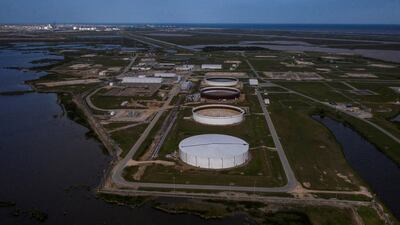Oil prices settled lower on Friday to post their fourth consecutive week of losses as fears of an economic slowdown led to concerns about weakening global crude demand.
Brent, the benchmark for two thirds of the world’s oil, declined 1.08 per cent to $74.17 a barrel at the close of trading on Friday. West Texas Intermediate, the gauge that tracks US crude, shed 1.17 per cent to settle at $70.04 a barrel.
“Weakening economic data from China and the US over the past week has raised questions around demand durability once more,” Emirates NBD economists said in a research note on Friday.
“This has offset an announcement by US energy secretary Jennifer Granholm that the US could start refilling the Strategic Petroleum Reserve by June.”
Ms Granholm said on Thursday that the congressionally mandated sale of 26 million barrels would be completed by June, “and it's at that point where we will flip the switch and then seek to purchase”.
“Everyone knew the US would have to begin purchases before the end of the year, but the June timeline seems a bit ahead of schedule,” said Ed Moya, senior market analyst at Oanda.
With oil “near the levels that the Biden administration was eyeing, it makes perfect sense for the US to fill up well in advance of winter”, he said.
Oil producers group Opec stuck to its 2023 growth projection for oil demand in its latest monthly report released on Thursday, although it slightly lowered its forecast for regions other than China.
Crude demand in Organisation for Economic Co-operation and Development (OECD) countries was lowered due to economic headwinds but was offset by an improvement in Chinese demand growth projects.
The world crude demand growth forecast for 2023 “remains the same as [the] previous month’s assessment” at 2.3 million barrels per day, with the OECD countries increasing by 70,000 bpd and non-OECD countries' growth at close to 2.3 million bpd, Opec said.
“Minor upward adjustments were made due to the better-than-expected performance in China’s economy while other regions are expected to see slight declines, due to economic challenges that are likely to weigh on oil demand,” Opec said.
“However, this forecast is subject to many uncertainties, including global economic developments and ongoing geopolitical tensions.”
Economic turbulence in recent weeks, triggered by a banking sector crisis in the US and Europe, has stoked worries in capital markets.
It has also raised questions about financial stability in light of the inflation-driven monetary tightening cycle.
The latest Chinese data confirmed that its economic reopening from Covid-19 “continues to disappoint”, said Mr Moya.
“US debt ceiling drama will eventually play a larger driver for oil prices, but right now whatever downside we are seeing with prices appears to be limited,” he said.
“Oil looks like it is ready to consolidate here. A lot of the bad news has been priced in, so fresh monthly lows seem unlikely.”
On the supply side, Iraq's Oil Ministry announced that crude exports from the northern pipeline that runs through Turkey would resume on Saturday.
About 450,000 barrels of oil were trapped in Iraq’s Kurdish region in late March after the International Chamber of Commerce ruled on a long-standing complaint from Baghdad against solo exports by the region.
Last month, a deal was struck between Baghdad and Erbil to allow the federal government to market the oil produced from the Kurdish region.
In April, Opec+ producers announced voluntary output cuts of 1.16 million bpd to ensure oil market stability. The cuts will be in place from May until the end of the year.
Earlier this week, Suhail Al Mazrouei, the UAE's Minister of Energy and Infrastructure, said the output cuts were aimed at balancing the oil market.
“I’m not that worried about the very short term, I think we can manage balancing the supply with demand,” he told reporters on the sidelines of the World Utilities Congress in Abu Dhabi.

